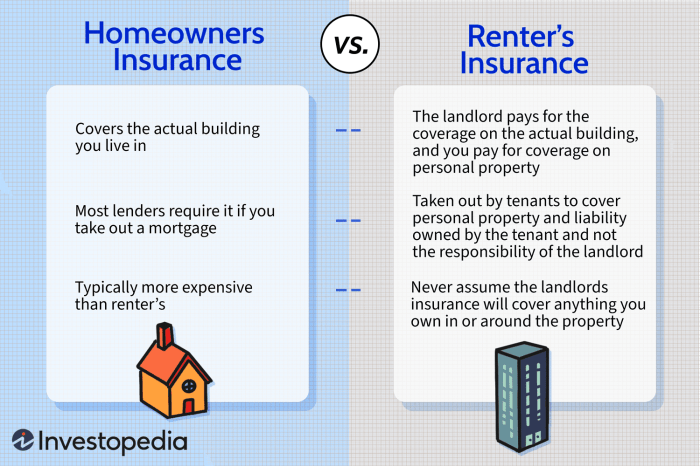Is it possible to bundle auto and renters insurance with homeowners insurance? Absolutely! Bundling insurance policies is a common practice that can save you money and simplify your life. This practice, known as multi-policy discounts, lets you combine multiple types of insurance under one policy, often with a reduced overall premium.
But, before diving into the details of bundling homeowners, renters, and auto insurance, let’s first understand the basics of insurance bundling and the various types of policies that can be combined.
Bundling Basics

Bundling insurance policies is a popular strategy that can help you save money and simplify your insurance needs. It involves combining multiple insurance policies, such as auto, renters, and homeowners insurance, under a single provider.
Types of Insurance Policies Often Bundled Together
Bundling is a common practice across various insurance types. Some common insurance policies that are often bundled together include:
- Auto insurance
- Renters insurance
- Homeowners insurance
- Umbrella insurance
- Life insurance
- Health insurance
Advantages of Bundling Insurance Policies, Is it possible to bundle auto and renters insurance with homeowners insurance
Bundling your insurance policies offers numerous advantages, including:
- Cost savings:Insurance companies often offer discounts to customers who bundle multiple policies. These discounts can be substantial, potentially saving you hundreds of dollars per year.
- Convenience:Having all your insurance policies with one provider simplifies your insurance management. You only have one point of contact for all your insurance needs, making it easier to make payments, file claims, and manage your policies.
- Streamlined communication:When you bundle your policies, you have a single point of contact for all your insurance needs. This makes it easier to communicate with your insurer, ask questions, and resolve issues.
- Potential for better customer service:Insurance companies often prioritize their bundled customers, providing them with better customer service and faster response times.
Homeowners and Renters Insurance

Homeowners and renters insurance are crucial for protecting your financial well-being in the event of unforeseen circumstances. These policies provide financial coverage for various perils that could damage your property or possessions, leaving you vulnerable to significant financial losses.
Homeowners Insurance
Homeowners insurance is designed to protect your home and belongings from various risks, including fire, theft, vandalism, and natural disasters. It provides financial coverage for repairs or replacement of damaged property, as well as liability protection in case someone gets injured on your property.
Here are some common inclusions in a standard homeowners insurance policy:* Dwelling Coverage:Covers damage to the physical structure of your home, including the roof, walls, foundation, and plumbing.
Other Structures Coverage
Protects detached structures on your property, such as a garage, shed, or fence.
Personal Property Coverage
Insures your belongings inside your home, including furniture, appliances, clothing, and electronics.
Liability Coverage
Provides financial protection if someone is injured on your property or you are held responsible for damage to someone else’s property.
Additional Living Expenses
Covers temporary housing costs and other expenses if you are unable to live in your home due to a covered event.
Renters Insurance
Renters insurance provides financial protection for your personal belongings and liability coverage while renting a property. While it does not cover the structure of the building itself, it protects your possessions from damage or loss due to covered perils. Key differences between homeowners and renters insurance:* Coverage:Homeowners insurance covers the structure of the home and the land it sits on, while renters insurance only covers the renter’s personal belongings.
Liability
Both policies offer liability coverage, but renters insurance typically has lower limits than homeowners insurance.
Cost
Renters insurance is generally less expensive than homeowners insurance due to its narrower scope of coverage.
Potential Risks and Liabilities Associated with Renting a Property
Renting a property comes with its own set of risks and liabilities. Landlords are generally responsible for maintaining the structure of the building, but renters are responsible for their own belongings and actions. Here are some potential risks and liabilities associated with renting a property:* Property Damage:Renters are typically responsible for any damage they cause to the rental property, beyond normal wear and tear.
Personal Injury
If someone is injured on your property, you could be held liable for their medical expenses and other damages.
Theft or Vandalism
Renters are responsible for protecting their belongings from theft or vandalism.
Natural Disasters
While landlords are typically responsible for major repairs after a natural disaster, renters may still face financial losses for their personal belongings.Renters insurance can provide financial protection for these risks and liabilities, mitigating potential financial losses.
Bundling Homeowners, Renters, and Auto Insurance: Is It Possible To Bundle Auto And Renters Insurance With Homeowners Insurance
It’s possible to bundle your homeowners, renters, and auto insurance policies together with the same insurance company. This practice is known as multi-policy bundling, and it’s a common strategy for saving money on your insurance premiums.
Benefits of Bundling
Bundling your homeowners, renters, and auto insurance policies can lead to significant savings. Here are some of the key benefits:
- Reduced Premiums:Insurance companies often offer discounts to policyholders who bundle multiple insurance types. These discounts can be substantial, potentially saving you hundreds of dollars per year.
- Simplified Management:Having all your insurance policies with one company can simplify your insurance management. You’ll only need to deal with one provider for all your insurance needs, making it easier to track your policies, make payments, and file claims.
- Improved Customer Service:Bundling can potentially lead to improved customer service. By being a multi-policy customer, you may receive priority service and dedicated support from your insurance provider.
Drawbacks of Bundling
While bundling offers numerous benefits, there are some potential drawbacks to consider:
- Limited Choice:Bundling often means choosing a single insurance company for all your insurance needs. This can limit your options and potentially lead to higher premiums if you can’t find a company that offers competitive rates for all your insurance types.
- Potential for Higher Overall Costs:In some cases, bundling may not result in significant savings, especially if you have multiple insurance policies with different companies already. It’s essential to compare quotes from different insurers to ensure that bundling is truly beneficial for you.
- Loss of Flexibility:Bundling can reduce your flexibility in adjusting your coverage or switching insurance providers. If you need to change your coverage or switch companies for one of your policies, you may need to make changes to all of your bundled policies.
Factors to Consider When Deciding Whether to Bundle
When deciding whether to bundle your homeowners, renters, and auto insurance, consider the following factors:
- Current Insurance Premiums:Compare your current premiums for each insurance type with the bundled quotes offered by different companies. This will help you determine if bundling would result in significant savings.
- Insurance Needs:Evaluate your insurance needs for each policy type. If you have specific coverage requirements or a complex insurance situation, bundling may not be the best option.
- Customer Service and Reputation:Research the customer service reputation and financial stability of the insurance company you’re considering for bundling. This will help you assess the long-term value of bundling with that particular provider.
Considerations for Bundling

Bundling your insurance policies can save you money, but there are some things to consider before you make the switch. Here are some key factors to weigh before deciding if bundling is right for you.
Potential Cost Savings of Bundling
Bundling different types of insurance can lead to significant cost savings. The amount you save depends on the specific insurance companies and policies you choose. However, here is a general comparison of potential savings for different insurance combinations:
| Insurance Combination | Potential Savings |
|---|---|
| Homeowners and Auto | 5-15% |
| Renters and Auto | 5-10% |
| Homeowners, Renters, and Auto | 10-20% |
Potential Drawbacks and Limitations of Bundling
While bundling can offer cost savings, there are some potential drawbacks to consider.
- Limited Choice:Bundling often means choosing all your policies with the same company. This might limit your options for finding the best coverage or rates for each individual policy.
- Potential for Higher Premiums:If you bundle policies with a company that doesn’t offer the best rates for all your needs, you might end up paying more overall than if you had separate policies with different companies.
- Complexity:Managing multiple policies with one company can sometimes be more complex than managing them separately. You might need to contact a single customer service representative for all your insurance needs.
Tips for Finding Competitive Rates and Bundling Options
Finding the best insurance rates and bundling options takes some research and comparison.
- Get Quotes from Multiple Companies:Don’t settle for the first quote you get. Compare quotes from several different insurance companies to see who offers the best rates for your specific needs.
- Consider Online Insurance Comparison Websites:Online comparison websites can help you quickly compare quotes from multiple insurance companies. Just be sure to read the fine print carefully before making any decisions.
- Ask About Bundling Discounts:When you’re getting quotes, be sure to ask about any bundling discounts the company offers. Some companies offer discounts for bundling two or more policies, while others offer discounts for bundling three or more policies.
- Review Your Coverage Regularly:Once you’ve bundled your policies, it’s important to review your coverage regularly to make sure it still meets your needs. Your insurance needs can change over time, so it’s important to adjust your coverage accordingly.
Closing Summary

In conclusion, bundling homeowners, renters, and auto insurance can be a smart move for many individuals, offering potential cost savings and convenience. However, carefully evaluating your needs and comparing quotes from different insurance providers is essential to ensure you’re getting the best value for your money.
Remember, a little research and comparison shopping can go a long way in securing the right insurance coverage at the most affordable price.
Expert Answers
How much can I save by bundling insurance?
The amount you save can vary depending on the insurance company, your individual coverage needs, and the specific policies you bundle. However, discounts can range from 5% to 25% or more.
Do I have to bundle all three types of insurance?
No, you can often bundle just homeowners and auto insurance or renters and auto insurance. The available bundling options vary by insurance provider.
What if I need different types of coverage for my vehicles?
Most insurance companies offer flexible bundling options, allowing you to bundle different types of auto insurance coverage, such as liability, collision, and comprehensive, for multiple vehicles.
What are some tips for finding the best bundling options?
Get quotes from multiple insurance providers, compare the coverage and discounts offered, and consider factors like your driving history, vehicle type, and location.
